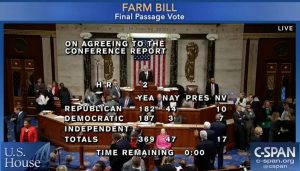Farm Progress' Joshua Baethge reported at the end of last week that "it’s hard to find anyone optimistic about passing a new farm bill this year. While the two political…
House Passes Farm Bill, 369-47
Following quick Senate action on Tuesday, and after surviving a close procedural vote on the Rules for debate, the House of Representatives passed the Farm Bill conference report on Wednesday by a vote of 369 to 47. The measure now heads to President Trump for his signature.

Wall Street Journal writer Andrew Duehren reported Wednesday that, “The final version of the bill, which passed with a 369-47 vote, broadly resembles the version the Senate passed this summer. It leaves out a proposed set of work requirements that passed along party lines in the House version of the legislation, disappointing some House Republicans but allowing Democrats in both chambers to support the legislation in large numbers. All of the 13 Senators who voted against the legislation in the Senate on Tuesday are Republicans.”
More Democrats than Republicans voted for the farm bill. 44 Republicans voted against and three Democrats (Kind, Blumenauer, Doggett).
— Liz Crampton (@liz_crampton) December 12, 2018
Politico writers Helena Bottemiller Evich and Catherine Boudreau reported Wednesday that, “The overwhelming bipartisan vote for the bill caps an eight-month fight over the legislation, marking a quick turnaround for House and Senate negotiators who were deadlocked in efforts to resolve a dispute over food stamps as recently as a few weeks ago.”
The Politico article noted that, “‘After a rocky start, I’m just proud to turn a partisan bill into a bipartisan bill,’ said House Agriculture ranking member Collin Peterson (D-Minn.), who led Democrats in opposing the original House measure earlier this year. ‘That’s the way Congress is supposed to work.’
“[House Ag Committee Chairman Mike Conaway (R, Tex.)], who was at odds with Peterson during much of the standoff over food stamps, commended the Democrat for delivering votes. ‘Collin and his team delivered across the board,’ the House Agriculture chairman said. ‘Team effort. Both parties, both sides, I think, are happy with it.'”
Evich and Boudreau added,
The final bill doesn’t alter SNAP benefits or change eligibility for the program in any significant way.
“House Republicans, who passed their original bill in June by just two votes after the bill had failed a month earlier, lost leverage in negotiations after the midterm elections. With Democrats set to take control of the House next month, Republicans had to fold on SNAP if they wanted to get a bill done,” the Politico article said.
And Associated Press writer Juliet Linderman reported Wednesday that, “It is now headed to the desk of President Donald Trump, who is expected to sign it.”
The AP article pointed out that, “The bill maintains current limits on farm subsidies, but includes a House provision to expand the definition of family to include first cousins, nieces and nephews, making them eligible for payments under the program.”
Great news! The 2018 Farm Bill will now go to @POTUS to be signed into law. See my remarks in support of the Conference Report below. pic.twitter.com/rLB5u3Tr7D
— Rep. Adrian Smith (@RepAdrianSmith) December 12, 2018
Also Wednesday, Bloomberg writers Daniel Flatley and Teaganne Finn reported that, “The measure now goes to Trump, who has indicated he supports it.”
Flatley and Finn explained that, “Congressional approval of H.R. 2 comes after farm programs under current law began to expire Sept. 30. ‘We made the compromises we needed to make to get this deal done,’ House Agriculture Committee Chairman Mike Conaway of Texas told reporters last month.”
Today the House of Representatives answered farmers and ranchers call to action and passed the 2018 Farm Bill. pic.twitter.com/qBTvXRsc1P
— Dr. Roger Marshall (@RogerMarshallMD) December 12, 2018
“The bill met with opposition from Senator Chuck Grassley, an Iowa Republican, who advocated for a provision to tighten subsidies for farmers. Instead, the bill expands the definition of family members eligible for subsidies to include first cousins, nieces, and nephews.
“Final passage in the House came after Republicans attached an unrelated provision that blocks lawmakers from forcing the chamber to vote on certain Yemen legislation until a new Congress takes over in January. The provision limits lawmakers’ efforts to push back on the U.S. role in Yemen’s civil war and relationship with Saudi Arabia amid bipartisan anger over the killing of journalist Jamal Khashoggi in the kingdom’s consulate in Istanbul,” the Bloomberg article said.
Rule vote for #FarmBill starting.... pic.twitter.com/x9cEZy8THp
— Farm Policy (@FarmPolicy) December 12, 2018
This Yemen provision made the vote on the Rule governing the debate on the Farm Bill Conference Committee very close, 206-203.
House approves the Rule for debate for the #FarmBill, 206-203
— Farm Policy (@FarmPolicy) December 12, 2018
Eighteen GOP members voted no on the Rule, while five Democrats supported it (below):
- Jim Costa (Calif.)
- Al Lawson (Fla.)
- Collin Peterson (Minn.)
- Dutch Ruppersberger (Md.)
- David Scott (Ga.)
If this procedural vote had failed, the House’s consideration of the Farm Bill Conference Committee report could have been more complicated.
Meanwhile, several members of the farmdoc team provided an initial review of the major provisions of the Farm Bill Conference Committee report in a farmdoc daily update from Wednesday: “The Agriculture Improvement Act of 2018: Initial Review.”





